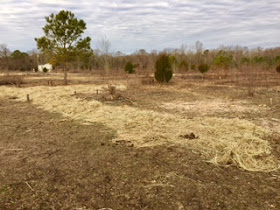A blog that focuses on our unique program that teaches natural horsemanship, heritage breed conservation, soil and water conservation, and even folk, roots, and Americana music. This blog discusses our efforts to prevent the extinction of the Corolla Spanish Mustang. Choctaw Colonial Spanish Horse, Marsh Tacky, and the remnants of the Grand Canyon Colonial Spanish Horse strain.
Saturday, March 24, 2018
Patience: It's More Important Than Planning
Planning has its place in program development. Depending on one's particular peculiarities it can be a spur for success, a security blanket, or a process that allows one to sit quietly while spinning wheels and going no where, yet still feeling good about one's "progress" in planning. I prefer innovation and creativity over planning in nearly every endeavor. Others may differ and find proceeding without detailed planning to be a terrifying concept. My point being is that one size does not fit all. I am not certain that one style is even better than the other or can even be counted on to produce better results than the other.
I have been told by exasperated people, in a tone that makes it sound like an accusation, that I "just get up in the morning and come up with a new idea and then just do it."
I plead guilty.
And for the last fifteen or so years of developing this program that has worked fine for me. I do not insist that it is how others should build their programs. I only point out that this is how I do things and I have no interest in being enlightened or informed so that I can learn to conform to more acceptable growth and management strategies.
But I am certain of one thing. Regardless of one's style of program development one must be patient, and even more difficult, one must require others to be patient. Today is the first Saturday that I am doing something that I should have been doing for years. I have cancelled riding because of the soil conditions. The ground is too wet and horse and human foot traffic will lead to soil compaction that will damage the pastures for months to come.
In a similar vein, too often I have allowed people to take horses out of a sacrifice paddock to "just let them have a little grass" in pastures that were resting. The result was fleeting enjoyment of pasture for the horse, a feeling of doing something good by the person, and season long damage to the pasture. This year that will stop.
Program participants will learn the importance of microbial development to the soil. They will learn the importance of pasture development for the actual health of the herd and will learn to completely disregard the momentary, false feeling of doing something healthy for a horse by letting it retard the growth of a resting pasture.
Like planning, patience is something that can also be a detriment to program development if abused. We have a very diverse group of program participants. Over the years I have sought to gently encourage and explain why we have certain practices involving natural horse care that are important for the health of the herd. I have been too patient in that approach and that too will end.
As with any program it is necessary to step back and evaluate management practices from time to time and to make corrections as needed. In recent years I have come to understand that the health of the horses is dependent of the health of the soil. Maintaining the health of the soil will be a top priority for the program.
It will take several years of sound soil conservation practices before we reach optimum pasture development. But that is alright. We will become a program in which participants learn the value of patience.
(The picture above is of a round bale rolled out on the New Land. the rolling out of the hay is of tremendous value to the soil and it helps the horses build much stronger top lines than standing and eating from a round bale. It is one of the changes that we are making to enhance the health of our soil and our horses.)

No comments:
Post a Comment